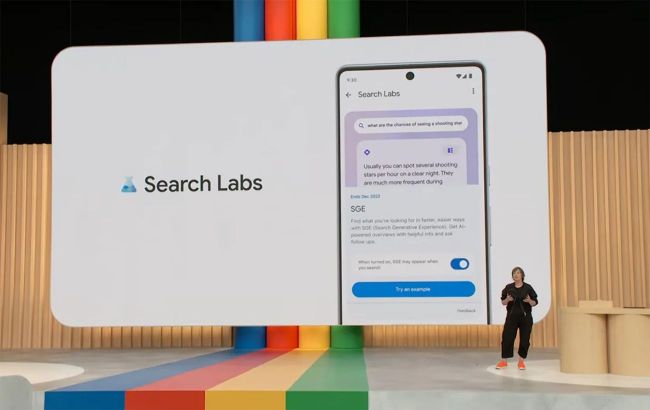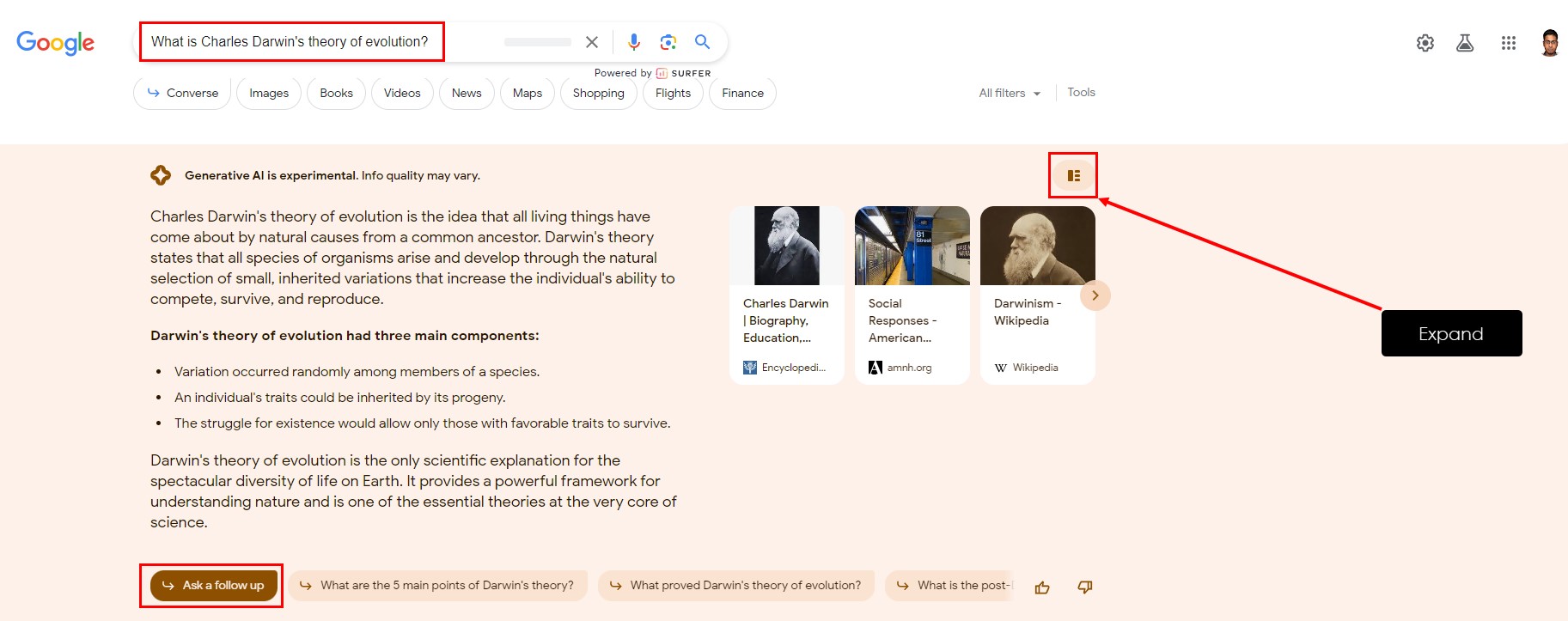Google's revolution: What is AI-powered Search Generative Experience and how it can change Internet
 Photo: Google is preparing another revolution for online search (Image Credits Google)
Photo: Google is preparing another revolution for online search (Image Credits Google)
The American company Google is introducing artificial intelligence (AI) into its search system. The technology is called Search Generative Experience (SGE), and it is expected to revolutionize how users search for information.
Read below about generative search, its advantages and disadvantages, as well as its impact on the Internet.
To prepare the story, the following sources were used: the official Google blog, Reuters, The New York Times, Financial Times, The Verge, Geekflare, Medium, and Search Engine Land.
The integration of artificial intelligence into Google became publicly known in May. At a spring presentation for Reuters, the company demonstrated an example: in response to the query "weather in San Francisco," the search engine provided standard information and a forecast for several days. And when asked what to wear, the system recommended a shirt, a lightweight sweater, or a jacket.
Limited testing took place over several months to monitor the quality, speed, and cost of search results. Recently, the system became available to users in the United States and the United Kingdom, gradually expanding with new features.
For example, advertisers can now generate images of products for free using the Product Studio service. It saves time and reduces the expenses of professional photo editors. However, the quality of the generated images raises questions, as AI may use copyrighted content. Google says that information about the author will be preserved in the metadata.
"New Product Studio, developed on the basis of Google's artificial intelligence, opens up opportunities for all sizes companies, helping them easily create unique images," said Matt Madrigal, a company representative.
It is currently unknown when Google will expand language support and make the Search Generative Experience available to Ukrainians.
What is Search Generative Experience?
Search Generative Experience using AI power is the next stage in the development of online search. AI has influenced our lives since the launch of personal assistants like Siri, Google Assistant, and others. It has also entered the multimedia industry to create text, images, videos, and audio based on keywords or instructions, for example, ChatGPT and Midjourney.
Naturally, the point at which AI begins to affect search on the World Wide Web has been a matter of time. Google is not a pioneer. Before it, Microsoft's Bing search introduced similar technology.

Photo: Standard search does not create content but provides a list of websites based on specific algorithms (Getty Images)
Generative search creates content based on existing patterns. If it becomes popular and accessible, the online search as we've known it for decades will change completely.
Traditional internet search is a manual process. Users need to enter a query or keyword, and the search engine scans websites and provides answers based on its algorithms.
The ranking of each site is influenced by factors like website authority, audience size, page quality, and other parameters. The search engine assigns a rating to each site, and the higher the rating, the closer to the top of the search results it appears. The traditional system does not create content; it finds it on various websites, after that users have to navigate to the source through links.
Generative search not only provides links; AI analyzes all search results, generates content, and displays it in the browser. If it becomes the new norm, there are several things to prepare for:
- Responses to queries will depend largely on the bias of the company (Google).
- Uploading the received information to your website may violate copyright.
- Online search efforts will significantly decrease, causing websites to lose traffic and revenue from contextual advertising.
How it works for Google
Let's say you need to find a dog walking agency. Your selection criteria can vary, from reputation to location. With standard search, it's not easy to input all these criteria at once. You typically need to find a service in your area, choose a specific agency, visit their website, and read reviews.
Generative search allows you to receive a detailed conversational response displayed at the top of the page. According to Google, this improves search quality, reduces manual work, and provides access to the best resources on the internet.
The goal is to allow users to ask complex questions directly to the Google search without relying on external AI tools. The response obtained should be similar to having a conversation with an expert in the relevant field. In fact, the experience can be compared to ChatGPT. However, ChatGPT cannot find fresh information or handle queries with multiple variables, while SGE can.
SGE generates a brief summary that provides a general idea of the search query. For example, your input is "What is Charles Darwin's theory of evolution?"

Photo: Response with Search Generative Experience (geekflare.com)
After looking through the theory, you can ask follow-up questions or visit the websites selected by the system. Google Search AI also enables fully dialog-based search. Below and above the original query, you will find buttons for Converse and Ask a follow up, which open a chat where AI provides answers and asks additional questions.
Additionally, new possibilities arise in niche searches. For instance, when querying "best Apple AirPods," the system provides the following.

Photo: Niche search with Search Generative Experience (geekflare.com)
The generative panel suggests what characteristics to pay attention to, lists delivery options, provides prices and displays reviews. This section is created based on Google Shopping Graph for the best shopping results.
Users still see contextual ads, and brands can continue to promote their products and services through the search engine. SGE also offers creative responses that are not available through traditional search. For example, when buying a product, the system can provide advice on how to showcase it on social media.
How to get started
To use SGE, you need to register for the beta test on Google Search Labs with your Google account. Then, join the desired project in Labs. To use SGE, you need to scroll down to the section "Help shape the future of Google's products" and join the waiting list. After that, register according to the instructions and wait for access confirmation to the Labs project.
Google then accepts you into the SGE project. An important point is that the technology is in its early stages and is only available in the United States and the United Kingdom. If you try to register from other locations, the system will reject it. However, you can gain access to the Labs With Google website through a VPN.
To activate generative search, you need to enable this feature. Go to Search Labs through the link in the invitation (via email) and switch on the corresponding toggle on the right, as well as agree to the terms in the pop-up window. After that, the feature will be activated in your account, and your next searches on Google Search will be carried out using artificial intelligence.
You can not only search for information but also create images like Midjourney does. Just type something like "draw a chef capybara cooking breakfast," and magic happens. Plus, it's free, unlike some other tools.

Photo: Image by SGE (theverge.com)
Drawn images can be further edited according to more specific preferences, exported, and used anywhere. Google representative Hema Budaraju states that the tool will not generate content that violates the company's policies. Also creating photorealistic images of well-known people is prohibited, at least at the initial stage.
Drawbacks and risks: What awaits content makers and online media
One of the main drawbacks is speed – searching with artificial intelligence works too slowly. The speed of loading animations may disappoint those accustomed to receiving quick results from Google. This can lead to a worsening of the user experience.
Another drawback is accuracy. The system is at an experimental stage and doesn't always provide correct answers. Furthermore, there will no longer be the traditional list of blue links that people use with Google from the late 1990s. Users may find it difficult to navigate in the new interface.
The search revolution is a concern for SEO experts and content creators, and many experts believe that the consequences for them will be significant. According to their opinion, Google's policy overall demonstrates a shift towards zero-click search.
Zero-click search is a type of search where the results displayed on the page do not require clicking on links, viewing headlines, and so on. Data from 2022 shows that about half of the queries in Google were zero-click, and the introduction of artificial intelligence will only accelerate this trend. Links to other sites remain, but it's evident that the focus is shifting towards SGE.
In the future, Google's search results page will have more space for search engine functions and less for traditional and paid search results. Independent research by Insight showed that only 57% of the links quoted by SGE are on the first page of organic results. The first link coincides with the organic one in only 12% of cases, and in 45% of cases, it doesn't make it into the top 10. The mechanism remains unclear, leaving room for abuse.
What does this mean for scaling companies? It means that SEO optimization will undergo a significant transformation. Content-focused companies will need to adapt to achieve high rankings in SGE and avoid losing clicks.
Web traffic is expected to decrease. The shift towards zero-click search will have a more substantial impact than just algorithm updates. Analysts fear that traffic may drop by 15-25%. Some of these losses will be associated with low-quality traffic that will never convert into real revenue, while some may not be. Paid search will also change. The SGE page provides fewer links compared to the traditional Google search results page. Even if it has more advertising space, it may not be enough.
American online media outlets are raising the alarm: generative AI violates news copyrights. According to their perspective, responses based on artificial traffic will reduce search traffic, resulting in revenue loss and job cuts.
According to a report by the News Media Alliance, representing the interests of about 2,000 news media outlets in the United States and Canada, developers of AI use high-quality content from news media for training generative systems, which compete with media.
"This is really displacing our work. You can see our articles just taken and replicated word-for-word," says NMA CEO Danielle Coffey.
The authoritative The New York Times was one of the first to close its content for AI training and added a clause to its terms prohibiting developers of artificial intelligence systems from using its materials.
Artificial intelligence still sparks heated debates, but it cannot be denied that the future belongs to it. While most of us are not using chatbots for email writing or research, technology companies believe that the way we communicate will soon change. The turning point could be the upcoming year of 2024.

